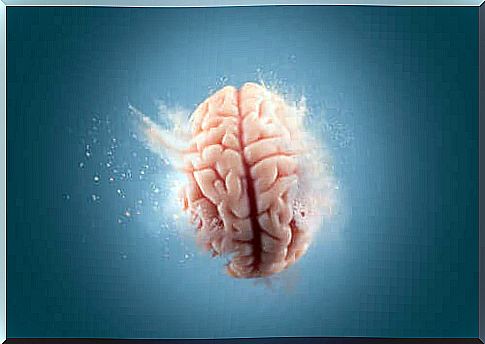The Effects Of Cocaine On The Brain

Cocaine is the second most consumed drug in France, and today we will discuss its effects on the brain in this article. Since the 1980s, it has been a real public health problem in the field of drug addiction. This substance is synthesized from the coca leaf. It causes a deep feeling of euphoria, a feeling of all power and excitement in those who consume it. It is also associated with a decrease in appetite, as well as a strong need to sleep.
In addition to these short-term effects, cocaine use also has strong long-term repercussions. For example, emotional or behavioral disorders. Let us now describe the main effects of cocaine on the brain at the anatomical, metabolic and functional levels.

Anatomical and Metabolic Effects of Cocaine on the Brain
Anatomical effects
This drug influences the noradrenergic and dopaminergic systems of the brain. More precisely, its mechanism is to promote the release of norepinephrine. At the same time, it inhibits the reuptake of serotonin, dopamine and norepinephrine by synapses. Thus, the availability of these neurotransmitters is much greater in the space between two neurons. In other words, at the level of the synaptic cleft.
This phenomenon results in a series of long-term brain changes. In post-mortem observations, it was found that the brains of cocaine addicts had a lower amount of dopamine in the striatum. But also a lower density of monoamines. In addition, there is also an increase in microglia and macrophages in these subjects. The expression of RNA which encodes dopamine transport is also disrupted. In other words, the use of cocaine is associated with a loss of dopamine terminals. But also quite simply neurons.
These cellular lesions lead the brain reward circuits, of which the dopaminergic circuit is a part, to modify their functionality. This results in compulsive consumption. Additionally, cocaine is characterized by acute withdrawal symptoms, depression, and severe craving. This is due to the decrease in the presence of dopamine, or hypodopamine, of natural origin in the metabolism.
Metabolic effects
On the other hand, it has been observed that the consumption of cocaine and other substances increases the presence of free radicals and the risks of the occurrence of oxidative stress. These cells, while necessary, are strongly linked to aging and cell damage. In addition, they interfere with the functioning of the blood-brain barrier. This physiological barrier is indeed fundamental to protect the brain from harmful external agents and maintain homeostasis.
Finally, the consumption of cocaine also has effects on the cerebral vessels. Strokes are therefore more likely in cocaine addicts than in the rest of the population. This is also true of cases of tumor necrosis.

Functional effects of cocaine on the brain
The changes and damage mentioned above obviously have a number of consequences on the neuropsychological functioning of consumers. In general, people who use cocaine score worse on neuropsychological assessment tests. The main impaired functionalities are attention, memory and executive functions.
More specifically, cocaine affects several cognitive systems. For example, the processes of selective and sustained attention, working memory, visual memory and the ability to learn. In fact, such effects become more marked during periods of abstinence.
When it comes to executive functions, people addicted to cocaine have more difficulty inhibiting their reactions. They are more impulsive and less able to make decisions. They are also less flexible in the face of change. Their ability to deal with errors and unforeseen events is also reduced.
In summary, cocaine use affects the brain of its user on many levels. In addition to the effects described above, cocaine use has multiple emotional, behavioral and social consequences. This obviously affects the quality of life of a person under the influence of this drug. Finally, cocaine is one of the most addictive drugs.










